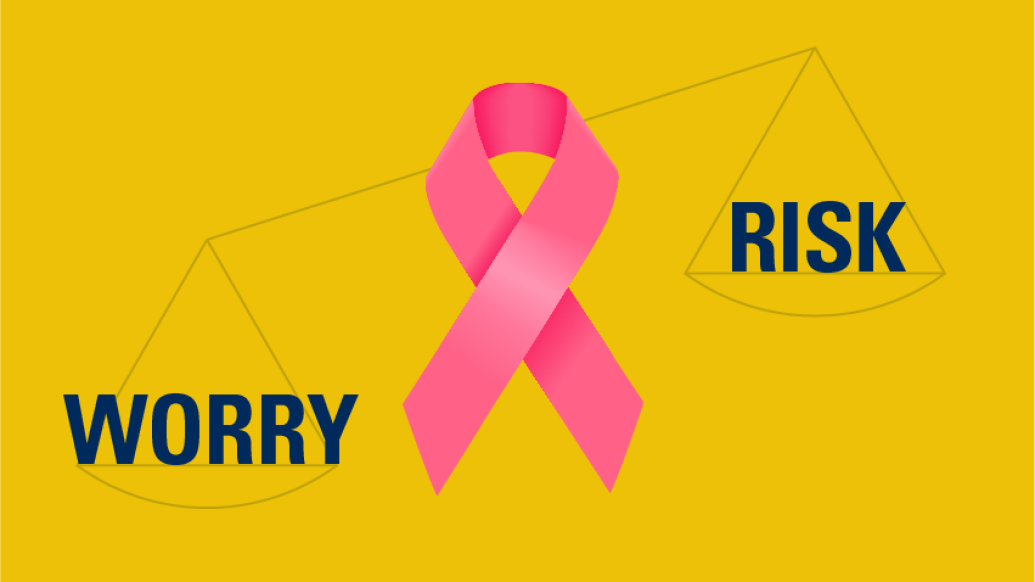For breast cancer patients, worry about recurrence is understandable. But up to a third of patients at low risk of distant recurrence overestimate their risk — and it’s affecting their quality of life.
8:00 AM
Author |

For patients with breast cancer — even after treatment — worries about risk are common. Patients wonder, could the cancer come back? Will it spread throughout the body?
But up to a third of those at low risk of distant recurrence substantially overestimate that risk, according to new research. And those who overestimate their risk of recurrence have a worse quality of life.
A group of researchers from the Cancer Surveillance and Outcomes Research Team at the University of Michigan Rogel Cancer Center surveyed 1,022 women treated for either ductal carcinoma in situ (DCIS) or low-risk invasive breast cancer. They found 36 percent of the DCIS patients and 25 percent of the low-risk patients substantially overestimated their risk of distant recurrence.
Women who overestimated their risk were three times more likely to report worry about recurrence. They had higher distress scores and lower mental health.
Sarah Hawley, Ph.D., MPH, professor of internal medicine at U-M, recently presented these results at the American Society of Clinical Oncology Quality Symposium. We talked with Hawley about these findings.
Why is this an important issue to study?
Hawley: Understanding the risk of both local and distant recurrence is important for cancer patients because it can influence treatment options or choices. Knowledge of one's disease is also a key component of informed decision making. There is limited research suggesting that misunderstanding the risk of distant recurrence can negatively influence quality of life, which motivated us to explore this issue in more detail.
Did you look at possible reasons why patients overestimated their risk?Why might there be such a discrepancy?
Hawley: There is research from the risk communication literature that has shown risk of disease or disease progression is a difficult concept for many people to understand. We did not look at reasons for overestimation in our study, though we are exploring this in our subsequent phase of work (when we asked women to directly indicate why they thought their risk was what itwas). Further work will also try to better understand what women are being told about their risk, and where they are getting their information.
What are the challenges for physicians when explaining risk, especially in an emotionally charged context like cancer?
Hawley: Because risk is a hard concept for people to understand, physicians have a challenge in describing this to patients. In breast cancer cases, differentiating between local recurrence (which can be treated and doesn't influence survival) and distant recurrence (which can only be managed and does influence survival) can also be difficult.
Explaining low risk can be further challenging as physicians want to make sure patients do understand that their risk is low, but not zero. Clearly, physicians are giving patients information that is both positive and scary at the same time.
Clearly, physicians are giving patients information that is both positive and scary at the same time.Sarah Hawley, Ph.D., MPH
You found that issues like worry and distress were higher in people who overestimated their risk. Isn't it natural for someone with breast cancer to worry about recurrence?
Hawley: We agree it's entirely natural for breast cancer patients to worry about their risk of recurrence. In fact, this is one of the most highly cited worries we have found in prior work. That said, helping patients understand that this risk is LOW could help them to manage or reduce this level of worry. If a patient believes she is likely to experience a recurrence, then this worry may be greater and may contribute to reduced quality of life.
What recommendations do you have based on your findings? What are your next steps?
Hawley: Our results suggest that patients should receive the "numbers" regarding their risk, but perhaps more importantly, they need to have a general understanding that their actual risk is low. We found that a descriptive measure of overestimation was more strongly associated with reduced quality of life and increased worry. Physicians could take a moment to assess their patients' level of understanding and correct any misunderstanding.
Further work is needed to understand more about how risk information is delivered to patients and the degree to which patients translate what they are told into a solid knowledge of their actual risk.
We are also working to develop tools for clinicians that can help provide guidance about communicating with their patients about risk. And we are developing tools that may help educate patients better about this risk, using both numeric and descriptive methods.
All patients with breast cancer will worry about recurrence, and that is natural. We recommend that patients advocate for being given good information about their actual risk, and be sure to get any questions that they have about it answered by their clinical team.

Explore a variety of health care news & stories by visiting the Health Lab home page for more articles.

Department of Communication at Michigan Medicine
Want top health & research news weekly? Sign up for Health Lab’s newsletters today!





